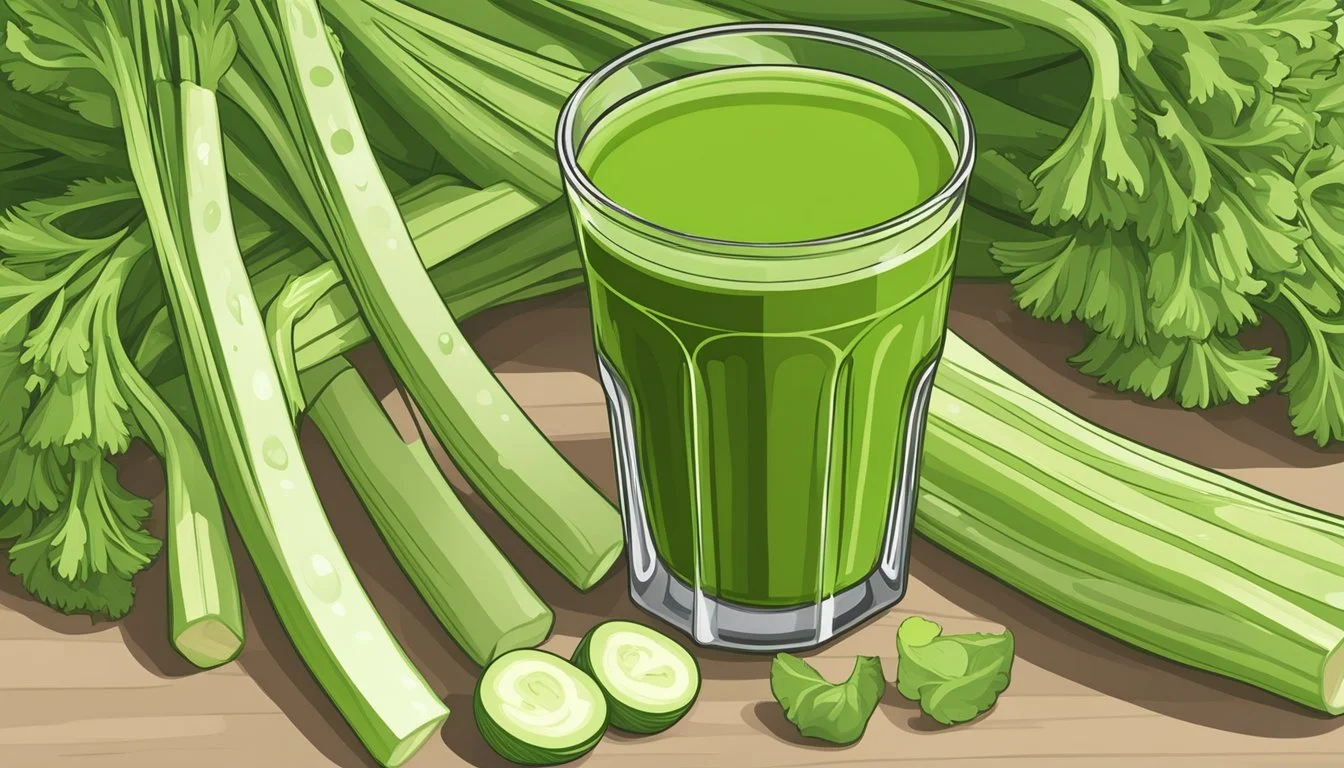Is Celery Juice a Miracle Elixir or an Overhyped Trend?
Separating Fact from Fiction
Celery juice has recently taken the spotlight in the wellness community, touted by some as a panacea capable of addressing a multitude of health issues. On social media platforms and health forums, influential figures praise the beverage for its purported ability to heal a range of conditions from digestive ailments to inflammation. The conversation around celery juice is often polarized, with ardent advocates on one side citing benefits such as detoxification and improved digestion, while skeptics on the other question the scientific foundation of these claims.
In assessing the phenomenon, it's essential to strike a balance between anecdotal testimonies and medical research. Celery itself is indeed nutritious, containing vitamins C and K, along with folate, potassium, and antioxidants. While these nutrients are beneficial to overall health, the direct correlation between drinking celery juice and curing diseases remains a topic of debate among nutritionists and health professionals.
With the rise of wellness trends, it has become increasingly important to examine health claims critically. While celery juice may not be a 'miracle elixir' as some suggest, it can still be a part of a healthy diet. However, assertions that it can singularly heal numerous health issues are not fully supported by current scientific evidence. As with any health trend, individuals are encouraged to consult healthcare professionals and consider the existing research when making dietary decisions.
The Rise of Celery Juice
Celery juice has surged in popularity, fueled by social media buzz and high-profile endorsements. Claims of its health benefits have led many to adopt it as a daily wellness ritual.
Social Media and Celebrity Endorsements
The trend of drinking celery juice gained substantial momentum through social media platforms like Instagram, where hashtags like #CeleryJuice became rife with thousands of posts. Celebrities, including Gwyneth Paltrow and her wellness brand Goop, have amplified the craze by promoting the beverage as part of their health and diet routines. High-profile endorsements often include personal testimonies about the benefits of celery juice, which has prompted health bloggers and influencers to join the movement, further positioning the drink as a wellness must-have.
The Medical Medium Phenomenon
Anthony William, also known as the Medical Medium, is largely credited with initiating the celery juice movement. He posits that drinking celery juice on an empty stomach each morning can lead to various health improvements, including enhanced digestion and detoxification. His books and online presence have garnered a significant following, with his advice often shared among those seeking alternative health strategies. While he is not a licensed healthcare professional, his influence is undeniable with celebrities like Robert DeNiro also supporting his claims, thus cementing celery juice's status as more than just a passing fad.
Nutritional Profile of Celery Juice
Exploring the nutritional landscape of celery juice reveals a beverage rich in vitamins and minerals. This section investigates its contents and the potential health implications of consuming this juice as compared to the whole vegetable.
Vitamins and Minerals Content
Celery juice is known for its high levels of vitamin K, essential for blood clotting and bone health. It also provides a good dose of potassium, which is crucial for heart function and muscle contractions. Additionally, celery juice offers a modest amount of vitamin C, beneficial for the immune system, and antioxidants that combat oxidative stress. The vitamins and minerals in celery juice contribute to its healthful properties.
Vitamin K: Crucial for blood clotting and bone health
Potassium: Important for heart and muscular function
Vitamin C: Supports immune health and iron absorption
Antioxidants: Help in reducing oxidative stress
Potential Health Benefits
The nutrients in celery juice may have several health benefits. For instance, the vitamin C in the juice aids in wound healing and might improve iron absorption, especially important for individuals with iron-deficiency anemia. The antioxidants in celery can reduce inflammation and, potentially, the risk of certain chronic diseases. It's posited that such antioxidants may also contribute to better heart health and a reduction in blood pressure.
Wound healing: Enhanced by the vitamin C content
Iron absorption: Vitamin C aids in the uptake of iron
Anti-inflammatory properties: Potentially reducing risks of chronic diseases
Heart health: Antioxidants may improve cardiovascular function
Comparison with Whole Celery and Other Juices
When comparing celery juice to whole celery, the juice generally provides a more concentrated source of nutrients since more stalks are used per serving. However, the juicing process may cause a slight loss of some vitamins like vitamin C due to heat and oxygen exposure. Importantly, celery juice lacks the fiber found in the whole stalk, which is vital for digestive health. Compared to other vegetable juices, celery juice may have a lower sugar content, making it a better option for those monitoring their sugar intake.
Concentrated nutrients: More celery is used to make juice than in an equivalent serving of whole celery
Vitamin loss: Minor losses of vitamins can occur during juicing
Lack of fiber: Juicing celery removes beneficial dietary fiber
Sugar content: Celery juice typically has less sugar compared to other vegetable juices
Claims Versus Science
This section scrutinizes the veracity of the health benefits attributed to celery juice, evaluates insights from nutrition experts, and assesses relevant clinical research findings.
Investigating the Efficacy of Celery Juice
Advocates like the Medical Medium, Anthony William, have popularized the notion that celery juice possesses almost miraculous healing properties. It is claimed that cluster salts in celery can eliminate troublesome pathogens – such as bacteria and viruses – suggesting a potential to assuage a spectrum of ailments from skin conditions to digestive issues. The supposed health benefits of celery juice also extend to claims of being anti-inflammatory, pressure-lowering, alkalizing, and detoxifying.
Expert Opinions and Registered Dietitian Insights
Registered dietitians and nutrition experts frequently underscore the importance of evidence-based approaches when considering the health impact of foods. They note that while celery is a healthy addition to one’s diet, rich in vitamins and known for anti-inflammatory properties, there is limited empirical data supporting the specific effects credited to celery juice by proponents such as Anthony William. Nutrition specialists stress the merit of comprehensive dietary strategies over reliance on single-item "cures."
Published Research and Clinical Studies
When sifting through published research, clinical studies specific to celery juice are scant, leaving many claims unsubstantiated by rigorous scientific methods. Meanwhile, it’s acknowledged that celery itself contains beneficial nutrients as recognized by the Environmental Working Group. However, the extraordinary benefits claimed by some enthusiasts do not yet have a sturdy basis in the form of peer-reviewed research confirming celery juice as a singular detoxifying agent or a definitively alkalizing substance with the ability to mitigate various health concerns.
Possible Side Effects and Considerations
While some individuals credit celery juice for various health benefits, it's crucial to be aware of the potential negative side effects that may accompany its consumption. Careful consideration of these effects is important for informed decision-making.
Digestive Issues and Bloating
Celery juice can lead to digestive discomfort for some individuals, manifesting as gas and bloating. The high fiber content, while generally healthy, can be tough on the digestive system when juiced.
Interactions with Medications
Medication interaction is another concern linked to celery juice. Certain compounds in celery may interfere with the efficacy of various medications. Individuals should consult healthcare providers to understand the potential risks.
Importance of Moderation and Balance
Given the lack of comprehensive studies, the importance of moderation cannot be overstressed. Overconsumption may lead to acid reflux or increased photosensitivity, particularly with a compound known as psoralen found in celery. Balance, as with any dietary addition, is fundamental to reducing the risk of harmful side effects.
Juicing Versus Whole Food Consumption
When it comes to nutritional intake, the method of consumption—through juicing or eating whole foods—significantly impacts the body's reception of nutrients, particularly fiber.
The Importance of Fiber in Diet
Dietary fiber is a critical component found in whole fruits and vegetables. The presence of fiber in the diet aids in digestion, promotes satiety, and is associated with improved glycemic control. A whole stalk of celery, for instance, offers both soluble and insoluble fiber. Soluble fiber helps to soften stool, while insoluble fiber adds bulk. Fiber is instrumental in balancing gut flora and it has a strong linkage to heart health as it can help to lower cholesterol levels.
The Pros and Cons of Juicing
Juicing has become a popular way to consume fruits and vegetables, often using a blender or juicer. The process extracts the liquid from produce, leaving most of the fiber behind. On the plus side, juicing can provide a condensed dose of vitamins and antioxidants since it often requires more produce to create a glass of juice than one might eat in a single sitting. However, without the fiber, the body processes these juices quickly, which may lead to rapid spikes in blood sugar levels.
Furthermore, the act of chewing whole foods not only contributes to satiety but also aids in the release of digestive enzymes that help in breaking down food. When fruits and vegetables are consumed whole, the body receives the comprehensive nutritional benefits, including the important dietary fiber, which is largely lost when juiced.
In summary, while juicing can be a part of a healthy diet, it does not replace the varied benefits of consuming whole fruits and vegetables.
Consumer Guidance for Celery Juice Intake
Incorporating celery juice into one's diet can be beneficial for hydration and can provide some nutritional value. Consumers should be mindful of how they select, prepare, and consume celery to maximize potential health benefits.
How to Integrate Celery Juice into Your Diet
To reap potential health benefits, individuals can start by adding a small amount of celery juice to their daily routine, gradually increasing to a full glass over time. They may consume it on an empty stomach in the morning to optimize absorption. Using a juicer can extract the juice efficiently while preserving nutrients. A cup of celery juice can contribute to daily hydration needs due to its high water content.
Selecting and Preparing Celery
When selecting celery for juicing, one should look for firm, fresh stalks with a bright green color. Washing the celery thoroughly is essential to remove any contaminants. For those concerned about pesticide exposure, it's recommended to choose organic celery, which is less likely to contain residues; this is especially important since celery is often listed in the Environmental Working Group's Dirty Dozen, a list of produce with higher pesticide levels.
Organic Versus Conventional Celery
Consumers choosing between organic and conventional celery should consider the potential chemical exposure and environmental factors. Organic farming standards aim to reduce the use of synthetic pesticides and fertilizers, which can be healthier for the consumer and more environmentally friendly. However, organic celery may be more expensive than its conventional counterpart. When organic options are not available or affordable, thoroughly washing conventional celery can help reduce pesticide residue.
Celery Juice in the Context of Overall Wellness
Celery juice has been advocated as a beneficial health beverage, contributing to wellness, energy, and vitality. It's important to understand its role within a balanced lifestyle and be mindful of the placebo effect that can sometimes influence user experiences.
Role in a Balanced Lifestyle
Celery juice should be incorporated as one component of a healthful diet rather than a singular cure-all. While it’s true that celery is rich in vitamins and minerals such as vitamin K, vitamin C, potassium, and folate, its juice form may provide a concentrated source of these nutrients. However, it is essential to maintain a variety of foods within one's diet to ensure comprehensive nutritional coverage. For many, celery juice serves to enhance hydration and may support digestion, especially when consumed in the morning on an empty stomach.
Understanding the Placebo Effect
The placebo effect can play a significant role in any health and wellness practice. When individuals believe they are doing something beneficial for their health, such as drinking celery juice, they may perceive an improvement in wellness and energy levels regardless of the drink's actual effectiveness. It is crucial to approach claims of health benefits with healthy skepticism and consider empirical evidence alongside personal anecdotes. While some individuals report positive changes, these effects are not universally experienced and should be weighed against scientific research and personal health status.
Assessing the Longevity of the Trend
Celery juice has oscillated between being touted as a miracle elixir and being seen as a component of a passing health trend. The following subsections explore whether this green juice has attained mainstream acceptance and what the future may hold for it within the realms of juicing and alternative medicine.
From Fad to Mainstream Acceptance?
Initially perceived by many as a fleeting fad, celery juice gained a substantial following through endorsements by health influencers and anecdotal testimonials. Long-standing dietary practices often pivot on the perceived benefits that align with contemporary wellness philosophies, and in the case of celery juice, these align with a focus on detoxification and natural health solutions. Its transition from a niche health regimen to a beverage that is widely available in grocery stores and juice bars suggests a level of acceptance beyond mere trendiness.
Evidence of longevity in health trends can be seen in sustained consumer demand, which for celery juice, is fueled by its reputed benefits such as improving digestion and providing essential vitamins and minerals. The practice of juicing, particularly for health benefits, has been interwoven with alternative medicine for several years; celery juice's alignment with this practice might contribute to its staying power.
Predictions for the Future of Celery Juice
Looking ahead, the trajectory of celery juice hinges on both scientific validation and cultural relevance. While extensive scientific research is sparse, the health claims associated with celery juice, such as alleviation of certain skin conditions and reduction of inflammation, merit further investigation. Should upcoming studies provide empirical support, celery juice may see a bolstered reputation within the sphere of health and wellness.
Despite the ebb and flow in popularity of any health trend, the consumer's quest for a holistic approach to wellness keeps the door open for celery juice's place in the future market. A continued preference for plant-based diets and natural remedies suggests that as long as celery juice is perceived to deliver health benefits, it could maintain or even grow its presence within the array of green juices on the market.





